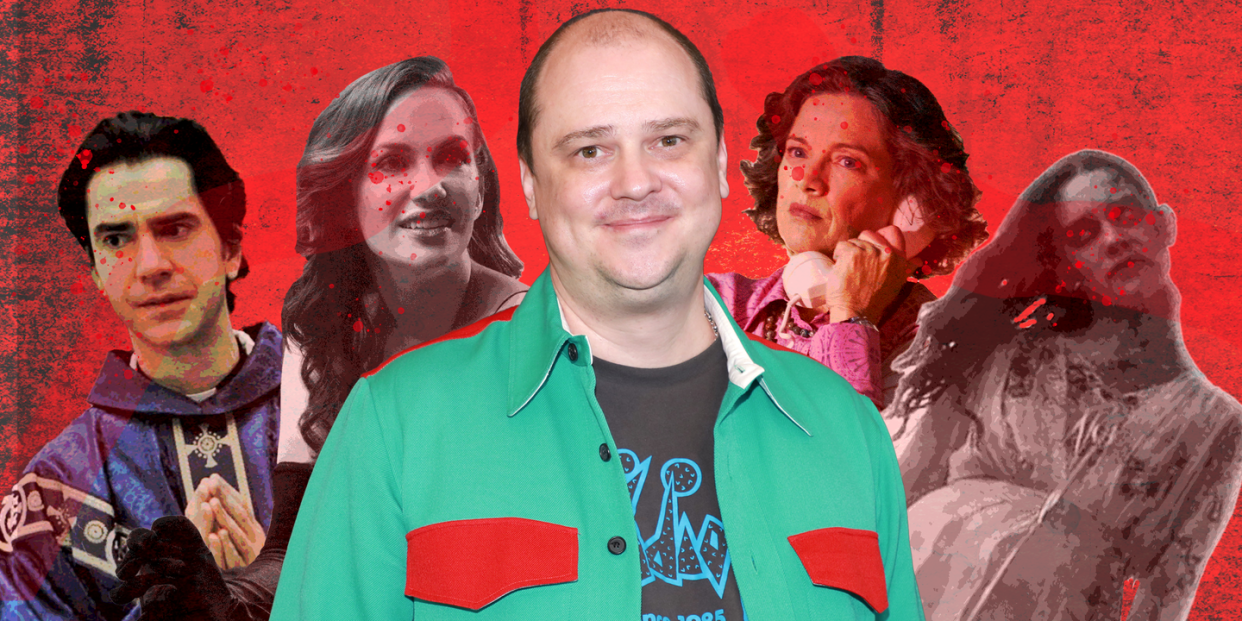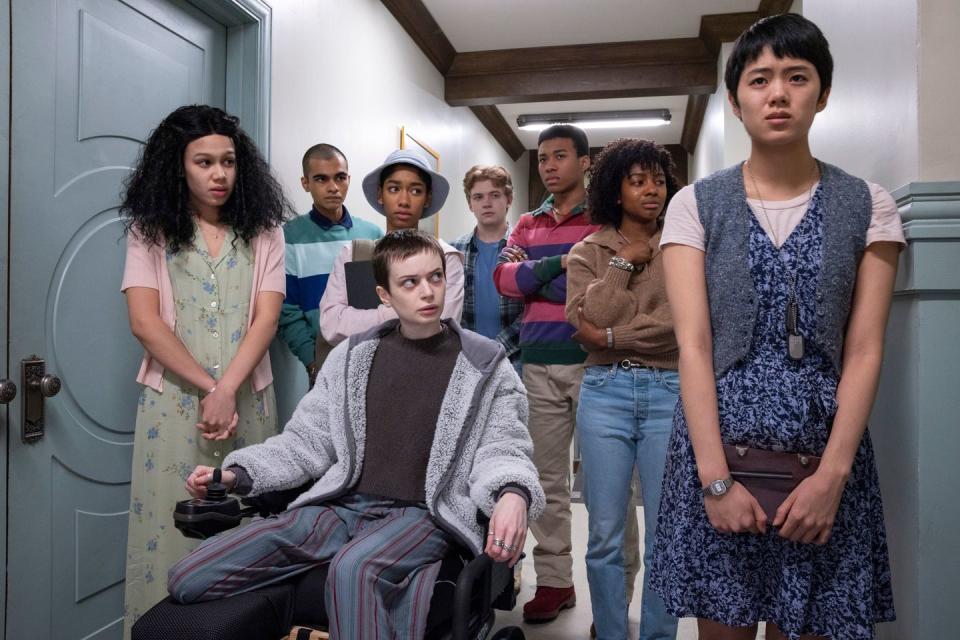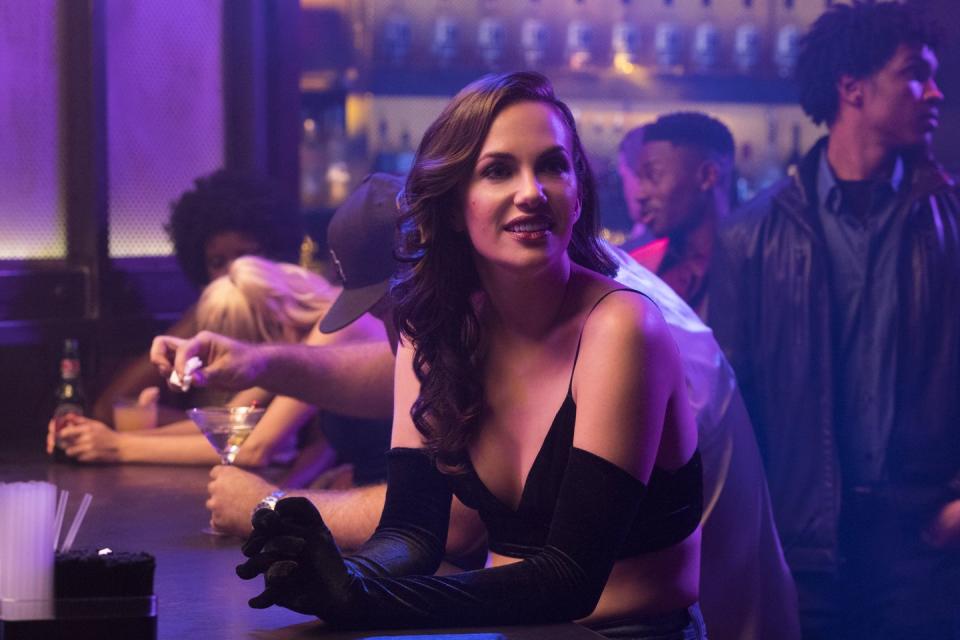Mike Flanagan Has Many More Horror Stories to Tell

- Oops!Something went wrong.Please try again later.
- Oops!Something went wrong.Please try again later.
"Hearst Magazines and Yahoo may earn commission or revenue on some items through the links below."
Here at Men’s Health we’re all about feeling alive. And is there any genre of entertainment that helps anyone feel more alive than the one where the threat of someone being knocked off is always right in front of you? We love horror, and we’re celebrating it this year with MH Horror Week. The following story is part of a collection we’ve curated celebrating some of our favorite films, TV shows, filmmakers, and performers in the genre. We hope you enjoy—and maybe find a few new scares along the way too.
You can find all of our MH Horror Week 2022 coverage right here.
DESPITE HIS INCREDIBLE SUCCESS, writer/director Mike Flanagan had a nerve-wracking time waiting out the reception of his latest horror series, The Midnight Club. A week before the show’s worldwide streaming launch, he said the anticipation made him “nauseous every day.” But if anyone can make a YA series—his first—both spooky and addicting, it’s the mind that created some of the best horror shows and movies of the last decade.
As far as long-running relationships with Netflix go, few are as successful as Flanagan’s. Along with his co-producer Trevor Macy, he's consistently crafted dark, suspenseful, and well-received horror that's both scary and meditative. His first project with Netflix was an adaptation of Stephen King's novel Gerald's Game, which came a year before his first series with Netflix: The Haunting of Hill House, an adaptation of the famous Shirley Jackson novel. Writer Stephen King—an icon of Flanagan's—called the show “a work of genius.” Since then, the 44-year-old has brought three other largely self-contained stories to the platform, with The Haunting of Bly Manor, Midnight Mass, and most recently The Midnight Club all garnering acclaim from fans and critics alike. He's currently working on an adaptation of Edgar Allan Poe’s The Fall of the House of Usher, which will also weave in other works from the famed horror writer. The Flanaverse is alive and thriving.
Flanagan went nostalgic with The Midnight Club, adapting the work of one of his favorite childhood authors, Christopher Pike. The show focuses on a group of teens in hospice care, all of whom like to distract themselves from their bleak reality by telling each other ghost stories. And, of course, there’s a deeper mystery they have to investigate beyond the tales. Flanagan frequently casts many of the same actors across his projects, but for The Midnight Club, he couldn’t use many of the adult actors from his previous productions. That gave him the opportunity to cast relatively new actors—along with scream queen Heather Langenkamp (A Nightmare on Elm Street), which he says made the teenager inside him go “ballistic.”
The Midnight Club is yet another strong entry in Flanagan’s filmography, and includes his signature winning formula: gripping mystery with that creeping sense of dread that he knows has us all on the hook. Flanagan took some time to talk to Men's Health about all of this, including some Midnight Club behind the scenes info, the horror books he's reading right now, and more.
MEN'S HEALTH: The Midnight Club is based on a series of books by Christopher Pike, which you read as a teenager. Did you reread those books before working on the show? What was that experience like?
Mike Flanagan: I had collected all of the paperbacks growing up. So I had this beat up kind of library of all the Pike books, and I would read them multiple times when I was a kid. And I'd really worn them out over the years.
After I talked to him and started to kind of put together a basic outline for what the show could be, I started to dive back in and it was a very nostalgic experience. It really dug up a lot of memories for me of being a teenager in the '90s and kind of what these stories were the first time I came across them. And it also showed me how much things have changed in a lot of ways since then. It made me feel very old, which was really fun.
Then I got to have the secondary experience of approaching these stories from a completely different point of view, which was as material to build from in a new story and a new show. I got to watch my writers room–some of whom were familiar with Pike and some who had never heard of him–approach these stories and react to them in real time, one at a time, as we started to break the season. And that was also really, really fascinating seeing younger writers who came up after that whole Pike era. Finding them for the first time and seeing what they grabbed on to, what they didn't grab on to, what they were mystified about, about the behaviors and some of the details of it, and where I got to be like, “Well back in the 19–”

How involved was Christopher Pike in the series?
He wasn't terribly involved in the episodic work, but he was always there. From the very first conversation. He was very fascinated by the process. There were things that were very important to him about how his work was represented. But he was also very cognizant of the fact that the show was not his books, and that it was going to be this whole new thing. He was excited about that. And he would read the scripts and come back and say, ‘I have some ideas, but I also don't want to mess with what you're doing. I want to read more. I want to see more.’
He intentionally stopped reading on the eighth episode, so that he experienced the end of the show for the first time when it aired and I thought that showed an enormous amount of trust. Which then led to an enormous amount of pressure, because I still don't know what he thinks in the end. When we get there, if he calls me up and goes full Stephen King/Stanley Kubrick on me, I'm gonna be devastated. But he was really enjoying it. So he kept, I would call it, a respectful distance. But we also wanted him to be as involved as we could have just to make sure we weren't rowing in the wrong direction.
Were there any parts of his books you really wanted to include in the show but couldn’t?
There were a number of things in the books we had to update. There were things in there that didn't hold up culturally, or that we just understand better now. So there was a lot that required changing everything from these particular stories that we wanted to get in.
If there are future seasons, and who knows if there will be or not, it would be wonderful to keep going, because any Christopher Pike fan is going to say where's Remember Me? We have a plan for that if we get to it. But that was one where I thought that story is so big, it would have hijacked this first season and there was a way to do it in a subsequent season. That made a lot more sense.
Your work with Netflix is your first foray into television. In the past you’ve focused on horror movies. What’s the difference between those two mediums? How does the medium change how a horror story is presented?
I love the longer format. I love being able to spend time with characters. I tried 10 years ago to develop Midnight Mass as a movie. Impossible. It would have been the worst movie anyone had ever seen. The opportunity to really spend time digging into the characters, into themes, there's no way we could sit there in a feature film and have people wonder what happens when we die for 20 minutes. So I love that. I love also the structural mechanics of building setups throughout hours of the first season of something and then finding ways to pay them all off on the back side. It's much harder to do that in a shorter form.
That said, it's much, much harder to sustain tension over a long period of time. So horror is really tough on TV. You can't keep that foot on someone's throat the way you do in a movie where you can have this suffocating, cool, adrenalizing tension but it dissipates in 90 minutes or two hours right? Drawing it out for 10 [hours] is really tough. People get exhausted. So you have to be engaging them on other levels. So I appreciate the challenges of both.
I've really enjoyed being able to tell these longer stories. But I'm also at this point, [The Midnight Club] is my fourth Netflix show. Usher is the fifth. I am at the point now where I'm actually very eager to get back to movies. I miss them. And I feel like I've left a lot on the field with the long form. I've gotten to tell some big sweeping stories. I never would have had the opportunity to otherwise. And I would love to design something for the big screen, for the communal audience experience to get back in a movie theater. So that's high on my list for next year.
Most of your shows have been based on books. Do you have any other works on your wishlist you’d love to adapt?
My dream project of all dream projects will always be Stephen King's The Dark Tower. That is the thing I want to make more than any other thing. And I will hope every day that there's a chance to do that. But there are wonderful authors out there, and what I've gotten to do since Bly Manor was to pull in more than one story from that author. We got to do it on this show. We did it on Bly, we were doing it on Usher. And that's some of the most fun I get to have, because a lot of these classic stories have been told and told very well.
To get in there and do The Turn of the Screw again, I could have done a passable job and been one of a dozen adaptations. But to get in there and pull these other stories in and find a way to try to make them make sense together, that's some of the most fun I get to have in an adaptation. And it provides freedom and this celebration quality, where like The Fall of the House of Usher, we are celebrating the work of Edgar Allan Poe. Skip rocks off of the various references and easter eggs and the connections from all these different stories. It makes it so fun. It makes it like a treasure hunt. If you're a fan you get to pick all this stuff out.
But yeah, Dark Tower for me. That would be number one. But my pile of other books and stories I'd love to adapt gets higher every year, because I relax by reading. Every time I read a book, I see it in my head. I say, ‘I would love to do that.’ My producing partner, Trevor, gets mad because he's like, ‘You have to stop trying to grab these books you're never going to make. You can't hold the rights to 10 novels in a year. You're never gonna make them. It’s just stopping them from being made.’
Are you reading anything fun right now?
Right now I'm reading Blackwater, which is a really, really cool book series that I'm really into, and I just finished a terrific novel called Echo by Thomas Olde Heuvelt who also wrote Hex, which is a phenomenal, phenomenal classic haunting/witch story in upstate New York that I would love to turn into a show.
I highly recommend Echo if you're looking for a really unique horror novel.
I've noticed you tend to use many of the same actors in your productions. Igby Rigney, for example, is in both Midnight Mass and The Midnight Club.
I tried desperately to keep my kind of little troupe together, the crew as well. Most of the crew of The Midnight Club did Midnight Mass, and then went on to do Usher. It's a bit of a family. And when you find people that you can work wonderfully with, my belief is to hold on to that. And so a lot of the actors for this, it was always gonna be a little different because the cast was so much younger. My staple people would have to come in as cameos —and we've got a fair amount of them who showed up to be on camera, and others who you hear [as audio cameos]. But you don’t know it’s them necessarily. We've hidden a few of them in there. If you've listened very carefully, you'll hear Hamish Linklater, Carla Gugino and Kate Siegel on the show.

And even on [The Midnight Club], there were cast members who rolled right off of this. For Ruth Codd and Sauriyan Sapkota, this is their first jobs ever, and they rolled right off of this into the House of Usher. And Igby Rigney is in the House of Usher as well. I love pulling people in. And it just makes me sad if I don't have a part for someone I really want to work with that's a good fit, or if they're booked, which is my favorite reason to not have an actor. They've booked another job. That always makes me very happy that they're out there working. But yeah, there's quite a few of the family in [The Midnight Club]. And you'll be seeing a lot of them again in the next show, too.
You often root for your actors on Twitter. It’s really cool to see such a vocally supportive director.
I mean this business is so brutal, right? And it's so hard, especially for actors, to get work. I just feel like we all lift each other up. I wouldn't be where I am without them. Celebrating them is as natural to me as breathing. And it makes me very happy to be able to do that. I'm thrilled to see them succeed. I just, I'll get grouchy if they book so many things that I don't get to see them for a while. They're all terrific.
If you’re going to hold the rights to 10 different books, I’m sure they’re going to be in a few of them, right?
[Laughs] There are some people I work with who I want to work with for the rest of my career. Kate, of course, we can collaborate on every aspect of our lives together and it's some of the joy of our marriage and our life to be able to work together. But Henry Thomas [One of Men's Health's favorite Scream Kings], I've worked with on every single job I've had since Ouija 2: Origin of Evil. Henry has been in without exception. And I can’t even say that of Kate.
Henry is one of those people who every time I approach a project, I'm like, where Henry goes is one of the first questions that occurs. Looking at any job, and if I don't have an immediate answer for some of these people, then I want to invent one. I'll come up with an answer for them. It doesn't feel to me like it's a Flanagan show unless I look over and these certain familiar faces are there. It’s like coming home every time.
You Might Also Like

